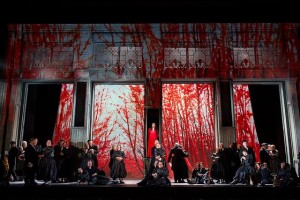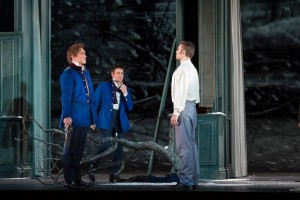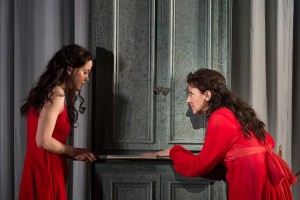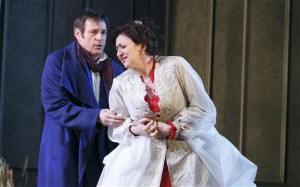 There are two great things about the live
There are two great things about the live
screening of performances in cinemas: the reduced price and multiple venues enable wider accessibility to a more diverse audience, it also softens the blow when you see a complete travesty and have avoided buying tickets at the Royal Opera House.
Tchaikovsky’s lyrical adaptation of Pushkin’s verse novel ‘Eugene Onegin’, directed by Kasper Holten at the ROH, carried great expectations. Sadly, Holten’s directorial debut became an unfortunate example of life reflecting art: naïve and chaotic, much like Tatyana’s impassioned and impulsive letter.
 Although Shoreditch’s Rich Mix cinema lacks the sophistication and grandeur of the Opera house, the screening compensated for this with a useful introduction to the performance, including interviews with the cast, costume and set designers, conductor and Holten, revealing some directorial decisions and aspects of the rehearsal process.
Although Shoreditch’s Rich Mix cinema lacks the sophistication and grandeur of the Opera house, the screening compensated for this with a useful introduction to the performance, including interviews with the cast, costume and set designers, conductor and Holten, revealing some directorial decisions and aspects of the rehearsal process.
Holten expressed a desire to channel Tchaikovsky’s vision of a simple and direct performance, in contrast with the grand operas so popular in the 1870s. Whereas Pushkin’s novel is elaborate, highly-stylsed and embedded with textual references, Tchaikovsky’s interpretation is essentially reduced to romantic tragedy and the familiar pain of regret. Holten’s production emphasizes this focus on nostalgia and the power of memory. However, rather than maximizing its simplicity and sincerity, his decisions overcomplicate the lyrical opera.
 This confusion is primarily caused by Holten’s decision to cast younger versions of Tatyana and Onegin, in the hope of exaggerating the nostalgia and regret for mistakes made in their youth. Initially, this seems relatively effective: the dancer, VIgdIs Hentze Olsen, depicting a young Tatyana provides a spectral, fleeting reminder of the past. The counterparts linked by their bold and recognizable red dresses, suggesting Tatyana’s passionate sentiment. However, this double-act soon becomes irritating and distracting. The poignancy of the famous letter-scene, in particular, was ruined by the dizzying sensation of double vision. Melodramatic pirouettes and gyrations detracted from Krassimira Stoyanoya’s performance, which alone would have been more powerful and moving.
This confusion is primarily caused by Holten’s decision to cast younger versions of Tatyana and Onegin, in the hope of exaggerating the nostalgia and regret for mistakes made in their youth. Initially, this seems relatively effective: the dancer, VIgdIs Hentze Olsen, depicting a young Tatyana provides a spectral, fleeting reminder of the past. The counterparts linked by their bold and recognizable red dresses, suggesting Tatyana’s passionate sentiment. However, this double-act soon becomes irritating and distracting. The poignancy of the famous letter-scene, in particular, was ruined by the dizzying sensation of double vision. Melodramatic pirouettes and gyrations detracted from Krassimira Stoyanoya’s performance, which alone would have been more powerful and moving.
 Another pivotal scene in the Opera is similarly tainted: the fatal duel between Onegin and Lensky, following Onegin’s flagrant flirtation with his best friend’s lover and Tatyana’s younger sister, Olga. Simon Keenlyside portrays Onegin as an unsophisticated flirt, rather than the imperious and bored aristocrat that Pushkin notoriously modeled on himself. The tragic duel is confused and verges on the ridiculous, as the old Onegin observes the unfolding scene with angst, whispering into his younger self’s ear in a hopeless effort to reverse fate. Tchaikovsky’s masterpiece dissolves into a crude take on ‘A Christmas Carol’, with the protagonist clumsily re-encountering the ghosts of his past. After Lensky is shot dead, the scene is similarly assassinated when the old Onegin takes the pistol from the young Onegin’s hands and gestures at suicide. Not only is this a glaring inconsistency, as the pair suddenly acknowledge each other, but the poignancy of this central scene is reduced to pantomime.
Another pivotal scene in the Opera is similarly tainted: the fatal duel between Onegin and Lensky, following Onegin’s flagrant flirtation with his best friend’s lover and Tatyana’s younger sister, Olga. Simon Keenlyside portrays Onegin as an unsophisticated flirt, rather than the imperious and bored aristocrat that Pushkin notoriously modeled on himself. The tragic duel is confused and verges on the ridiculous, as the old Onegin observes the unfolding scene with angst, whispering into his younger self’s ear in a hopeless effort to reverse fate. Tchaikovsky’s masterpiece dissolves into a crude take on ‘A Christmas Carol’, with the protagonist clumsily re-encountering the ghosts of his past. After Lensky is shot dead, the scene is similarly assassinated when the old Onegin takes the pistol from the young Onegin’s hands and gestures at suicide. Not only is this a glaring inconsistency, as the pair suddenly acknowledge each other, but the poignancy of this central scene is reduced to pantomime.
As the performance lurches on, the stage is increasingly strewn with the wreckage of these memories: piles of novels belonging to the bookish young Tatyana; bales of hay representing their provincial youth in the country; snow lacing the surfaces; the large incumbent tree branch present at the duel, and the dead body of Lensky lying centre-stage, inert. These objects effectively signify the events that haunt Onegin’s mind and traumatise his present, though they also clutter the stage and interfere with the sleek minimalism of the set design.
The performance was saved by the endurance and magnificence of Tchaikovsky’s score, conducted by the young and energetic Robin Ticciati, leading the tremendous Orchestra. Pavol Breslik’s Lensky received the biggest applause, and rightly so. Equally captivating was Elena Maximova’s Olga, which suggests that casting doubles for Tatyana and Onegin was the show’s main downfall.
During the introduction, Holten inadvertently revealed what was perhaps the cause of his poor direction: ‘This opera has a very special place in my heart […] When you do a piece that you really love, it’s almost sometimes harder than when you do a piece that you find tricky.’




